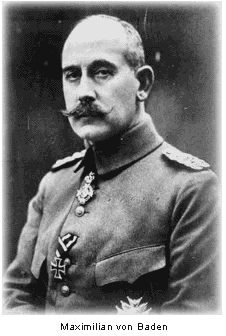Armistice
During the World War I offensives of 1918, the futility of the German war effort became clear to a number of their military leaders. In early October, General Erich Ludendorff urged the new chancellor, Prince Maximilian of Baden, to seek a cessation of hostilities. Swiss representatives were used to convey German interest in seeking an end to the war under the terms of the Fourteen Points that Woodrow Wilson had proposed earlier in the year.
 The Germans hoped to negotiate with the American president Wilson, whom they regarded as idealistic and somewhat soft. They were confident they could secure more favorable terms from him than the other Allied leaders. Wilson, however, turned out to be a firm negotiator and insisted on the creation of a representative German government as a prerequisite for peace.
The Germans hoped to negotiate with the American president Wilson, whom they regarded as idealistic and somewhat soft. They were confident they could secure more favorable terms from him than the other Allied leaders. Wilson, however, turned out to be a firm negotiator and insisted on the creation of a representative German government as a prerequisite for peace.
Foot dragging occurred in the weeks following an initial contact. The Allies, especially Britain and France, worked to modify Wilson’s plans for the postwar world, while war and peace factions in Germany struggled for dominance. Three events in late October and early November prepared the way for an armistice:
- Britain and France accepted Wilson's Fourteen Points as the framework for peace, in return for Wilson’s agreement with two significant reservations posed by U.S. Senator Henry Cabot Lodge: (1) "The United States reserves the right to determine when it can withdraw from the League of Nations," and (2) "Nothing compels the United States to ensure border contiguity or political independence of any nation, to interfere in foreign domestic disputes regardless of their status in the League, or to command troops or ships without Congressional declaration of war."
- The Kiel Mutiny flared up, in which German sailors refused to take part in a last-ditch and probably suicidal attack on the British Royal Navy. This event touched off revolutionary activity in other parts of Germany and undermined those who wanted to continue the war.
- The abdication of Kaiser Wilhelm II, who fled the country on November 9, opened the door to the establishment of a nominal German Republic.
At the 11th hour of the 11th day of the 11th month of 1918, the guns on the Western Front fell silent. The terms of the armistice had been prepared by the Allied High Command, not by Wilson. Their task had been to extract as many concessions as possible from Germany, but not push the enemy so far that the war would continue, necessitating an immeasurably costly invasion of the German homeland. Major terms of the armistice included the following:
- German soldiers were to pull back to the Rhine River and leave their war equipment behind; German tanks, aircraft and heavy artillery were to be destroyed; German railway trains and trucks were to be turned over to the Allies
- The German cities of Mainz, Coblenz and Cologne were to remain in Allied hands
- The Allied governments reserved the right to claim reparations from the Central Powers
- The German fleet was to surrender and be interned
- German merchant ships were to be removed to neutral or Allied ports
- The treaties of Brest-Litovsk and Bucharest would be abrogated
- The Allied blockade was to remain in force until formal peace agreements were signed
- All detainees of Germany, prisoners of war and civilians, were to be allowed to return to their country of origin; this provision did not apply to German prisoners in Allied hands.
Not everyone greeted the news of the armistice with approval.
Theodore Roosevelt,
General John J. Pershing and others believed that a lasting peace could not really be secured until the German military was defeated on German soil. Such sentiments were not without foundation. A perception would soon develop in Germany that their nation had been enticed by the Fourteen Points to lay down their arms, and that they did so despite the perceived fact that they still had sufficient military strength to prosecute the war. Great bitterness resulted when it became evident that a punitive peace was to be imposed, not one based upon the more generous Fourteen Points.
The elation that Wilson felt in seeing a conclusion of the fighting and the acceptance of his Fourteen Points by the Allies was soon deflated. The American voting public turned a deaf ear to the president’s appeal for a Democratic Congress in the midterm elections in November 1918, which portended an unhappy fate for Wilson’s peace plans.
 The Germans hoped to negotiate with the American president Wilson, whom they regarded as idealistic and somewhat soft. They were confident they could secure more favorable terms from him than the other Allied leaders. Wilson, however, turned out to be a firm negotiator and insisted on the creation of a representative German government as a prerequisite for peace.
The Germans hoped to negotiate with the American president Wilson, whom they regarded as idealistic and somewhat soft. They were confident they could secure more favorable terms from him than the other Allied leaders. Wilson, however, turned out to be a firm negotiator and insisted on the creation of a representative German government as a prerequisite for peace.